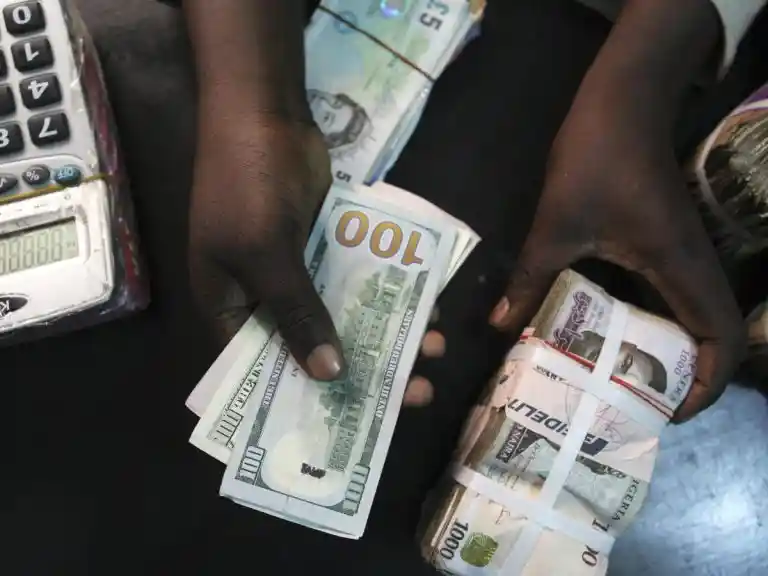The naira depreciated further against the United States dollar on Thursday, August 1, 2025, as the exchange rate in the black market climbed to ₦1,565 per dollar, reflecting increased demand pressure and continued forex supply constraints in the official market.
In Lagos, Abuja, Kano, and other key trading hubs, street traders and bureau de change operators sold dollars at an average of ₦1,560 to ₦1,565, up from ₦1,550 recorded earlier in the week.
TJ News Nigeria reports that the spike represents a near 1% depreciation in a single day, widening the gap between the official rate and the parallel market.
Black Market Rates Surge Amid Persistent Dollar Demand
The parallel market, often referred to as the “aboki FX” market, has become the primary source of foreign exchange for many Nigerians due to limited access through official banking channels.
According to data obtained from currency traders and independent monitoring platforms such as NairaToday.com and NgnRates.com, the dollar exchanged as follows:
- Lagos (Ikeja, Lekki, and CMS): ₦1,560–₦1,565
- Abuja (Wuse & Garki): ₦1,555–₦1,560
- Kano (Sabon Gari Market): ₦1,550–₦1,560
Rate tracking service AbokiFX also published a daily average of ₦1,550 per USD, based on user-submitted street quotes.
Official Market Lags Behind Parallel Rate
The official exchange rate as published by the Central Bank of Nigeria (CBN) and traded on the Nigerian Foreign Exchange Market (NFEM) remained significantly lower. On July 30, 2025, the naira closed at ₦1,534.50 per dollar, highlighting a spread of over ₦30 between the two markets.
This widening disparity has fueled speculation and panic buying in the informal market, with many importers, students, and travelers preferring the parallel rate for ease and accessibility.
Factors Behind the Naira’s Depreciation
Economic analysts have linked the current depreciation to several converging factors:
- Scarcity of forex supply from the CBN, leading to unmet demands for Personal Travel Allowance (PTA) and Business Travel Allowance (BTA)
- Increased speculative activity due to fears of further naira weakness
- Limited FX inflows from crude oil revenues and foreign direct investments
- Higher import bills driven by rising global commodity prices
A currency trader in Lagos told TJ News Nigeria that the market has remained volatile. “People are scrambling for dollars, especially business owners trying to pay foreign suppliers. The official channels are not reliable, so demand is spilling over here.”
CBN’s Position and Market Outlook
The Central Bank has yet to make an official comment on the latest spike in the parallel market. However, financial experts warn that without increased FX liquidity and tighter regulation, the naira could fall further in coming weeks.
According to LongForecast.com and 30Rates.com, projections for August 2025 show the naira hovering between ₦1,540 and ₦1,580 against the dollar if the current trends continue.
Economic Implications for Nigerians
The depreciation in the naira’s value has immediate effects on Nigeria’s inflation, consumer prices, and import costs:
- Imported goods, especially electronics, spare parts, and pharmaceuticals, are expected to rise further in price.
- Tuition payments and medical bills abroad now cost more in naira terms.
- Small and medium enterprises (SMEs) that rely on imported raw materials may face profitability pressures.
- Diaspora remittances, often sent via black-market channels, now fetch more naira per dollar—an incentive for parallel transactions over official platforms.
Summary: Key Forex Indicators (August 1, 2025)
| Market | Exchange Rate | Change vs. Previous Day |
|---|---|---|
| Black Market (avg.) | ₦1,565 | ↑ ~0.97% |
| Official CBN Rate | ₦1,534.50 | — |
| Rate Gap | ₦30+ | Widening |
What to Watch
- Possible CBN intervention or policy adjustments to stabilize the naira
- Impact on Nigeria’s external reserves and debt servicing
- Trends in diaspora remittances and import financing
- Fluctuations in global oil prices, Nigeria’s top forex earner
Economists say restoring confidence in the official market and expanding FX supply will be key to closing the gap and curbing inflationary pressure.
TJ News Nigeria will continue monitoring the naira-dollar trajectory and provide verified daily updates as the forex landscape evolves.






